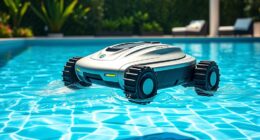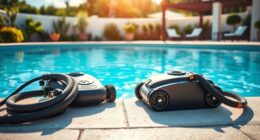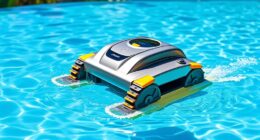When hosting a swim race, you are not just bringing athletes together to compete – you are also responsible for creating a safe, enjoyable, and well-organized environment. To achieve this, focus on providing a structured environment that highlights skills, encourages a sense of community, and offers opportunities for recognition and awards. Ensure a secure swimming environment by maintaining proper water quality, using lane lines and starting blocks, and having clear signage and safety equipment. Effective event planning, volunteer coordination, and technology utilization are also crucial. By considering these factors, you will be on track to host a memorable and safe swimming competition that athletes will enjoy.
Key Takeaways
- Effective swim event planning involves strategic race scheduling, water fluctuation impact on course setup, and parking availability for a smooth execution.
- Ensuring participant safety protocols includes developing a thermal plan, assigning roles to event officials, and having a detailed emergency response plan in place.
- Utilizing technology for swim events simplifies the registration process, provides free marketing tools, and streamlines RaceDay operations with flexible bib assignment.
- A safe swimming environment is maintained by ensuring proper water quality, using lane lines and starting blocks, and having clear signage and safety equipment for emergencies.
- Building a strong swim community involves fostering a sense of belonging among swimmers, participating in team events, and utilizing team tents for relaxation and bonding.
Benefits of Organized Swim Races
By participating in organized swim races, you'll discover a structured environment that allows you to showcase your skills, compete against peers, and reap a multitude of benefits.
These events foster a sense of community and camaraderie among participants, as you'll often find yourself cheering on teammates and fellow competitors. Additionally, organized swim races provide opportunities to receive recognition and awards for outstanding performances, motivating you to push yourself to new heights.
Coaches play an essential role in maintaining a positive atmosphere, focusing on encouragement and showcasing your abilities. At these events, you'll have the chance to bring essential items, snacks, and personal gear to ensure a comfortable and enjoyable racing experience.
Creating a Safe Swimming Environment

As you work on creating a safe swimming environment, you'll need to focus on two critical aspects: pool area preparation and emergency response planning. By concentrating on these key areas, you can guarantee that your swim race isn't only fun but also secure for all participants.
Pool Area Preparation
To create a safe and organized swimming competition, you'll need to prepare the pool area carefully. This includes making sure the pool water quality meets safety standards with proper pH and chlorine levels. You'll also need to place lane lines to separate swimmers and prevent collisions during races. Additionally, set up starting blocks at appropriate heights for different age groups.
| Pool Area Preparation | Importance |
|---|---|
| Proper water quality | Prevents swimmer illness |
| Lane lines and starting blocks | Prevents collisions and guarantees fair racing |
| Clear signage and safety equipment | Ensures rapid response in emergencies |
When organizing a swim race, whether it's an Open Water Swim or a pool competition, safety should always be the top priority. By following these preparation steps, you can create a safe and enjoyable experience for all participants. Remember, a well-prepared pool area is essential for a successful and safe swimming competition.
Emergency Response Planning
You'll need a critical emergency response plan in place to guarantee a safe swimming environment during the competition. This plan should outline the roles of lifeguards, course monitors, and emergency protocols, following USMS guidelines to ensure a thorough safety framework.
As you develop your plan, consider the safety guidelines for swim races. This includes the number of lifeguards required per swimmer and the emergency procedures for common incidents like cardiac arrests or spinal injuries.
During the event, it's important to monitor safety measures closely. Make sure that all personnel are aware of their roles and responsibilities. A quick and effective emergency response can mean the difference between a minor incident and a major crisis.
Effective Swim Event Planning

When organizing a swim race, you'll need to develop a solid plan to guarantee a smooth and enjoyable experience for participants.
Effective swim event planning involves strategically scheduling races and meticulously coordinating logistics to prevent last-minute hiccups.
Race Scheduling Strategies
By carefully taking into account several key factors, you can develop a swim race schedule that guarantees a fun and safe experience for all participants. When creating your schedule, it's important to think about the impact of water fluctuation on course setup. This will ensure that the course is set up in a way that minimizes the risk of accidents and ensures a smooth flow of participants.
Additionally, evaluate parking availability and potential shuttle systems to guarantee efficient event planning. Draft an event plan and race day timeline to ensure smooth execution. This plan should include details on event setup, participant check-in, and race start times.
Finalize venue and course maps for participants to navigate during the race. This will help reduce confusion and ensure participants know where they need to be and when. A well-planned schedule is vital to the success of your swim race. By taking these factors into account, you can create a safe and enjoyable experience for all participants.
Swim Meet Logistics
As you focus on effective swim event planning, it's time to tackle the logistics of your swim meet, ensuring that every detail is addressed to create a seamless and enjoyable experience for participants.
Pre-event planning is important, involving venue selection, course setup, and evaluating water temperatures and weather conditions. Safety measures are also necessary, including creating venue and course maps, developing a safety plan, and ensuring proper staffing with certified officials.
For Masters Swimming events, it's critical to follow the sanctioning process, which involves contacting the LMSC sanctions chair, seeking sponsors, and submitting safety plans for review.
During the event, logistics for execution include determining distances, coordinating with timing companies, and collecting feedback from volunteers.
Role of Volunteers in Swim Events

You depend on volunteers to fill essential roles in swim events, from registration and timing to course monitoring and safety measures. These dedicated individuals are the backbone of a successful competition, guaranteeing that everything runs smoothly and safely.
As a volunteer, you'll be part of a team that creates a positive and supportive atmosphere for swimmers, providing encouragement and assistance as needed. You may take on roles such as certified officials, lifeguards, course marshals, or event staff, each playing a crucial part in the event's success.
Your contributions will be crucial in setting up equipment, managing logistics, and supporting participants throughout the competition. Additionally, you'll help with crowd control, provide first aid if needed, and coordinate with event organizers to ensure a safe and enjoyable experience for all involved.
Utilizing Technology for Swim Events

With swim event technology, you can simplify the registration process with customizable platforms, making it easy for participants to sign up and get ready to jump into the pool. This technology is designed to make your life easier, providing a seamless experience for both you and your participants.
Some of the benefits of using swim event technology include:
- Free marketing tools for email, websites, referral programs, and social sharing, helping you spread the word about your swim events
- Integrated donations and fundraising tools, perfect for nonprofits looking to make a splash
- Streamlined RaceDay operations with flexible bib assignment and on-site registration, ensuring a smooth and efficient event
- Safety and engagement tools to enhance the participant experience, keeping them engaged and motivated throughout the competition
Registration and Fundraising Strategies

Effective registration and fundraising strategies are essential to the success of your swim race. A well-planned approach can make all the difference in covering administrative costs and supporting charitable causes.
When it comes to registration, you'll need to decide on registration fees that will cover the costs of organizing the event. You can use online platforms or event management systems to facilitate pre-registration, making it easier for participants to sign up and pay their registration fees.
In addition to registration fees, you can also encourage participants to engage in fundraising efforts. This can include setting team fundraising goals or individual participant fundraising targets. Participants can seek sponsorships or donations from family and friends, and all donations collected can go towards supporting charitable causes or organizations.
Ensuring Participant Safety Protocols

Creating a thorough safety plan that follows USMS guidelines is essential to guaranteeing an enjoyable and secure experience for all participants. As you organize your swim race, it's important to prioritize safety above all else. This involves developing a detailed plan that outlines emergency protocols, assigns roles to key personnel, and ensures the presence of lifeguards and course monitors during the event.
To guarantee participant safety, consider the following key measures:
- Develop a thermal plan based on water temperature standards to address any temperature-related safety concerns
- Assign roles to an event director, safety director, and referee to ensure smooth implementation of safety protocols
- Have a detailed emergency response plan in place, including first aid kits and communication devices
- Continuously monitor safety measures throughout the event to ensure participant well-being
Building a Strong Swim Community

By fostering a sense of belonging among swimmers, you can build a strong swim community that motivates and inspires its members to perform at their best. This sense of community is crucial, particularly in Open Water Swim events where teamwork and camaraderie can make all the difference.
As a swimmer, you can contribute to building this community by participating in team events and supporting your teammates. Coaches play an important role in maintaining a positive atmosphere and supporting swimmers to showcase their skills.
Additionally, team tents offer a space for swimmers to relax, refuel, and bond with their teammates, promoting unity and camaraderie within the swim community. To make sure a comfortable and enjoyable experience, it's important to be prepared with essential items, personal belongings, and healthy snacks.
Promoting Swim Events Successfully

You can greatly enhance your swim event's visibility and attract more participants when you harness the power of digital marketing tools and strategies. In today's digital age, utilizing free marketing tools like email marketing and social sharing can be a game-changer for promoting swim events effectively. For instance, RunSignup's platform can help streamline communications with participants and increase event visibility.
Here are some effective ways to promote your swim event:
- Utilize email marketing to send targeted promotional emails to potential participants.
- Leverage social media platforms to share engaging content and create buzz around your event.
- Use RunSignup's Email V2 feature to streamline communications and increase event visibility.
- Highlight the unique aspects of your event, such as open water swimming, to attract participants looking for a unique experience.
Hosting a Memorable Swim Event

As you prepare to host a memorable swim event, you'll want to focus on three key aspects:
- Planning a unique theme that resonates with your participants.
- Managing the pool layout to guarantee a smooth and efficient competition.
- Scheduling the event in a timely manner to keep the enthusiasm high.
By prioritizing these elements, you'll set the stage for a fun and engaging experience that leaves a lasting impression on your participants.
Event Theme Planning
Hosting a memorable swim event starts with planning a unique event theme that sets the tone for a fun and engaging competition. As you plan your event theme, you'll want to contemplate a few key elements to make your event stand out.
Here are some ideas to get you started:
- Create a tropical paradise or superhero splash theme to transport participants and spectators to a fun and exciting atmosphere.
- Develop themed decorations, costumes, and music to engage participants and spectators.
- Offer themed awards, prizes, or giveaways that align with the event's theme to add an extra layer of excitement.
- Plan themed activities or games for participants to enjoy before or after the races to keep the energy high.
Pool Layout Management
Effective pool layout management is crucial to delivering a seamless and enjoyable swim event experience, where every detail counts in guaranteeing a smooth flow of participants, spectators, and officials. You need to carefully assess the pool layout to ensure a successful event. A well-planned pool layout contributes to a memorable and successful swimming competition, enhancing race logistics, timing accuracy, and spectator enjoyment.
| Pool Layout Considerations | Impact on Event |
|---|---|
| Lane availability and allocation | Secures smooth participant flow and safety |
| Spectator seating and viewing areas | Improves overall event experience and enjoyment |
| Timing equipment placement | Influences timing accuracy and reliability |
| Event officials' and volunteers' positioning | Affects event organization and execution |
Timely Event Scheduling
You'll need to carefully plan your event schedule to guarantee a seamless and enjoyable experience for participants and spectators alike, taking into account factors like water temperatures, weather conditions, and venue capacity. Timely event scheduling is essential for hosting a memorable swim event.
To make sure a smooth execution, create a detailed event plan, safety plan, and race day timeline. Assign roles to event staff, confirm USMS certification, and establish communication systems to avoid last-minute confusion.
To further enhance your event, consider the following:
- Develop a detailed schedule that allows for flexibility in case of unexpected delays or changes.
- Designate specific areas for warm-ups, cool-downs, and athlete relaxation to minimize congestion.
- Plan for regular breaks to give participants and officials time to rest and recharge.
- Establish a clear protocol for handling emergencies or unexpected incidents.
Frequently Asked Questions
How to Organize a Swimathon?
You'll start by setting a clear fundraising goal and choosing a date, then plan the course, set up registration, recruit volunteers, and promote the event to make your swimathon a splashing success!
What Are Swimming Competitions Called?
You've probably participated in a million swimming competitions without knowing what to call them! Swimming competitions are commonly referred to as swim races or swim meets, where participants compete in various distances and strokes.
How to Organize a Swimming Gala?
You'll organize a swimming gala by identifying a suitable venue, coordinating with officials and volunteers, creating a detailed schedule, implementing safety measures, and promoting team spirit to guarantee a fun and safe event.
How Can I Make My Swim Practice More Fun?
You can make your swim practice more fun by incorporating games, music, and themed sessions, which will keep you engaged and motivated, and even rotating practice locations to add some excitement to your routine.
Are the Safety Measures for Diving Games Similar to Swim Races?
When it comes to fun and safe diving games, the safety measures are similar to swim races. Both activities require proper equipment, thorough briefings on rules and safety guidelines, and constant supervision by trained professionals. While the nature of the activities may differ, the emphasis on safety remains a top priority for both diving games and swim races.
Conclusion
As you reflect on the significance of organized swim races, remember that a well-executed event is like a finely tuned machine, with every component working in harmony to create a symphony of speed and sportsmanship.
Just as a swimmer's strokes propel them through the water, a successful swim event propels the community forward, fostering growth, camaraderie, and a shared passion for the sport.










